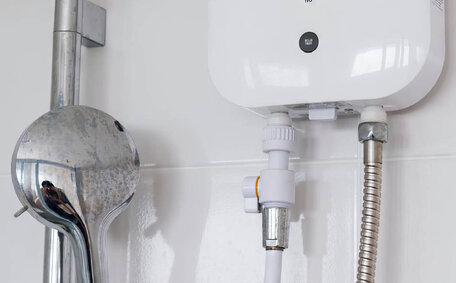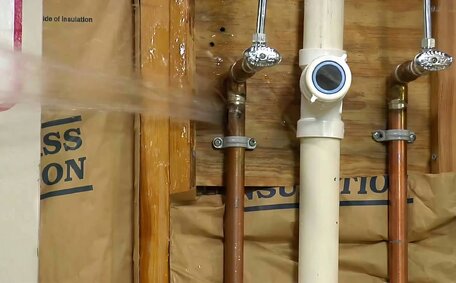Introduction: Signs of a Gas Leak and What to Do
If you detect a sulphuric, rotten-egg scent in your home, you may have a gas leak which poses serious risks without prompt, effective management. Gas companies add a distinct odorant to natural gas, aiding in easier detection of the gas leak coming your way with a smell similar to rotten eggs. Immediate action is required if you smell gas inside your domicile, to tackle any potential natural gas leaks.
Some common signs indicating a possible gas leak include:
- A strong, pungent odour suggestive of a gas leak
- A hissing noise near gas appliances or pipes
- Dead or dying vegetation near gas equipment
- Dirt or dust blowing from a hole or crack in the ground
- Flames exiting the soil, potentially indicating gas line damage
Should you detect any of these gas leak indicators on your property, it’s crucial to act immediately by following these steps:
- If you suspect a gas leak, evacuate everyone from the premises to a safe distance, well away from the odour
- Deactivate any electronics or appliances that might spark, such as mobile phones and other devices
- Contact your gas distributor’s emergency hotline to report the issue
- If the gas distributor cannot be reached, dial emergency services on 000
- Refrain from re-entering the premises if you smell gas inside, awaiting authorisation from emergency personnel or your gas provider
An unaddressed gas leak can cause serious issues like explosions, fires, or carbon monoxide poisoning in your home. Rapid detection and recognition of gas leak signs, coupled with immediate safety actions, are critical in preventing disasters. If uncertain about what to do if you smell gas in your home, evacuate immediately and contact a licensed gas fitter without delay.
Assessing the Severity and Identifying the Source of the Gas Smell
When you can smell gas in your home, it’s crucial to safe do not investigate the source yourself but rather focus on safety first. Trying to identify the gas leak source by yourself can be extremely hazardous.
Though you should not investigate, as you evacuate, check gas appliances such as water heaters and cooktops for obvious leakage indicators, including hissing sounds or visible damage.
This check includes a quick glance at pilot lights and water systems and should only be done if it’s along your exit path when you smell gas in your home, and poses no further hazard.
Avoid lingering in the area and do not ignite matches or other potential sources of ignition to prevent spark-induced explosions in case of a gas leak. Permit a professional licensed plumber to conduct a detailed site inspection and identify the source of the gas leak within your home’s pipelines or appliances.
While you do smell gas and it might appear a minor household issue, it’s essential to stay safe and take action, as it can rapidly escalate into a major gas emergency situation. Be sure all aspects of the situation are managed with exacting attention, as leaks in such precarious circumstances require the expertise of a licensed professional equipped for gas leak detection and repairs.
Safely Evacuating the Area
In a gas leak event, your first move is to shut off the gas supply and prioritise an immediate evacuation. Shut off gas supply and avoid toggling electrical switches on or off; be particularly cautious if a gas detector signals the presence of gas near potential leak sources. Emergency exits and thoroughfares should remain clear and accessible.
Conduct an orderly evacuation, alerting all occupants immediately if a gas leak can be confirmed, ensuring they leave promptly through the nearest safe exit. Guide children, elderly and pets to go outside and reach safety. While it’s good to alert neighbours if you can, always prioritise your family’s safety first.
Once outside and if you smell gas outside, ensure everyone remains at a safe distance, upwind if possible and at least 20 metres away, from the suspected gas leak area while awaiting the gas distributor or emergency services. Restrict entry to the site and wait for emergency gas crews or authorities to arrive. Do not enter a building with a suspected gas leak until it has been officially declared safe.
Premature return may risk allowing seeped gas to reach hazardous levels within your dwelling. Allow professionals with gas detectors to thoroughly inspect your property to ensure safe re-entry, as leaks can reoccur if the source where gas leak originated is not adequately repaired.
Contacting Emergency Services and Getting Professional Help
If you suspect a dangerous does gas leak, immediately call emergency services on 000 to get professional help containing the situation and making it safe. Supply the contact details, including location and your gas appliances if affected if known, along with a secure number to communicate with you. Ensure everyone stays clear of the site until emergency crews arrive.
Once the area is secured, Quickly get in touch with your local gas supplier or a certified gas fitter to examine your gas lines and devices.
Proffer any crucial details you observed during evacuation, but don’t try to investigate on your own. Allow professionals with specialised equipment thoroughly check for the source of the gas leak.
In the Bexley vicinity, for gas leak concerns and expert gas plumbing assistance, get touch with Bexley Plumbing, continually available at gas leak 1800 427 000 for gas emergencies and associated plumbing crises. You can only return home once a thorough inspection by qualified technicians deems it safe to re-enter.
Returning Home Safely After a Gas Leak
Turn off main gas gas at the main valve and all gas appliances before re-entering your home after a gas leak, and wait for authorisation from emergency services or your gas company. They will perform thorough checks with gas detection equipment and ensure licenced technicians have secured the site and repaired the leak source.
Aerate your home completely by opening all windows and doors to speed up gas dissipation, particularly if there’s a tell-tale rotten egg smell. Do not turn on any lights or appliances until properly aired out. Then call on your gas fitter to inspect all appliances and gas connections to verify their correct and safe functionality before being put back into service.
Ensure you receive documentation from a licensed gas technician affirming the areas have been monitored and are safe for occupancy following a gas leak—if gas levels are below explosive limits. This clearance confirms the remediation of leaks, proper appliance configuration and the restoration of safety. Keep copies of all paperwork detailing the work completed.
Never downplay gas leak risks or consider re-entering without clearance. Always comply with directions from emergency services and licenced professionals regarding safe return after an incident. Correct protocols protect lives.
Installing Gas Detectors and Appliance Maintenance for Prevention
Installing gas detectors near work areas or close to your home’s gas meter can mitigate leaks and enhance safety. Gas detectors should be placed near potential leak sources like appliances, gas lines and your local gas metre. Having both natural gas and carbon monoxide detectors provides an alert system for potential hazards.
Regularly test your gas detectors each month for efficient performance and change their batteries annually.
Schedule annual maintenance checks by qualified technicians to ensure the work on your gas meter is controlled and free from any potential leaks. Appliances such as hot water systems, cooktops, ovens, and gas heating units require comprehensive inspections and servicing to maintain or replace components as needed. This helps prevent leaks plus improves energy efficiency and appliance lifespan.
Ensure gas cylinders, petrol cans and other flammable materials are stored externally or in well-ventilated areas. Routine inspections, proper storage, and maintenance are crucial in reducing leak risks that may cause danger.
Recognizing Symptoms of Gas Exposure
Exposure to hazardous gases like natural gas or carbon monoxide can provoke symptoms of poisoning, such as headaches, dizziness, nausea, fatigue, and breathing difficulties. More severe exposures may lead to loss of consciousness or even death.
What should I do when I experience gas leak symptoms? Seek medical help right away if you or others experience symptoms during or after a known gas leak. Call emergency services to do a gas leak check and get everyone safely out of the area in case gas is still present inside. Administer first aid and get fresh air to anyone showing physical effects.
While symptoms sometimes manifest quickly, low concentrations over longer periods also progressively impact health. Have a doctor evaluate anyone exposed to verify no underlying organ damage or other problems. Do not underestimate warning signs - take action promptly as gas-related symptoms can worsen rapidly if the body remains exposed.
Understanding Dangers Like Carbon Monoxide
Carbon monoxide can also be an odourless, colourless gas that can be deadly, especially during a gas leak— if not detected early in natural gas propane systems. Liquefied petroleum gas (LP gas) and natural gas, like other fossil fuels including oil and coal, are combustion sources that can produce gas. Gas appliances like water heaters, stovetops and ovens all emit carbon monoxide as a byproduct when operating.
During an Australian gas leak, levels of gases denser than air can rise to dangerous levels off main living areas inside a home or building. This gas prevents blood from carrying oxygen effectively, leading to carbon monoxide poisoning with symptoms like headaches, nausea, dizziness and confusion. Extended exposure could result in serious health outcomes such as unconsciousness, brain injury, or even fatality if there gas leak in the atmosphere.
Install carbon monoxide detectors on each level of your home following the manufacturer’s guidance, usually under 1.5 metres above ground. Test alarms monthly and replace batteries yearly. Combination carbon monoxide and natural gas detectors provide ample warning to dangerous exposure during leaks.
If your carbon monoxide alarm sounds, evacuate immediately, turn off the main gas supply if it’s safe to do so, and call emergency services. Do not ignore warnings as carbon monoxide is entirely undetectable by smell. Ventilate the property by opening doors and windows, turning off your gas supply, and allowing qualified professionals to inspect and certify safe operation before re-entry.
Routine maintenance on gas-burning appliances by professionals minimises hazards.
Maintain vigilance with detectors and timely servicing for maximum safety.
Using Licensed Professionals for Installations and Inspections
When it comes to gas appliances and systems, it is critical to use qualified, Australian gas-certified professionals for installations, maintenance, and inspections, including your gas meter. Improperly installed or faulty gas equipment can lead to dangerous leaks, fires, explosions, and exposure to toxic gases like carbon monoxide.
Enlisting experts such as Bexley Plumbing assures that work gas leak issues are addressed, meeting stringent safety and compliance benchmarks. Experienced and qualified technicians from Bexley Plumbing perform diligent work on gas systems and appliances, ensuring optimal performance and safety during annual checks.
Maintain detailed records of service dates and repairs for all your gas appliances and systems. Note the technicians’ names, licence details, and scope of work completed. Schedule future routine inspections well in advance to stay continually vigilant regarding gas safety and operational integrity.






